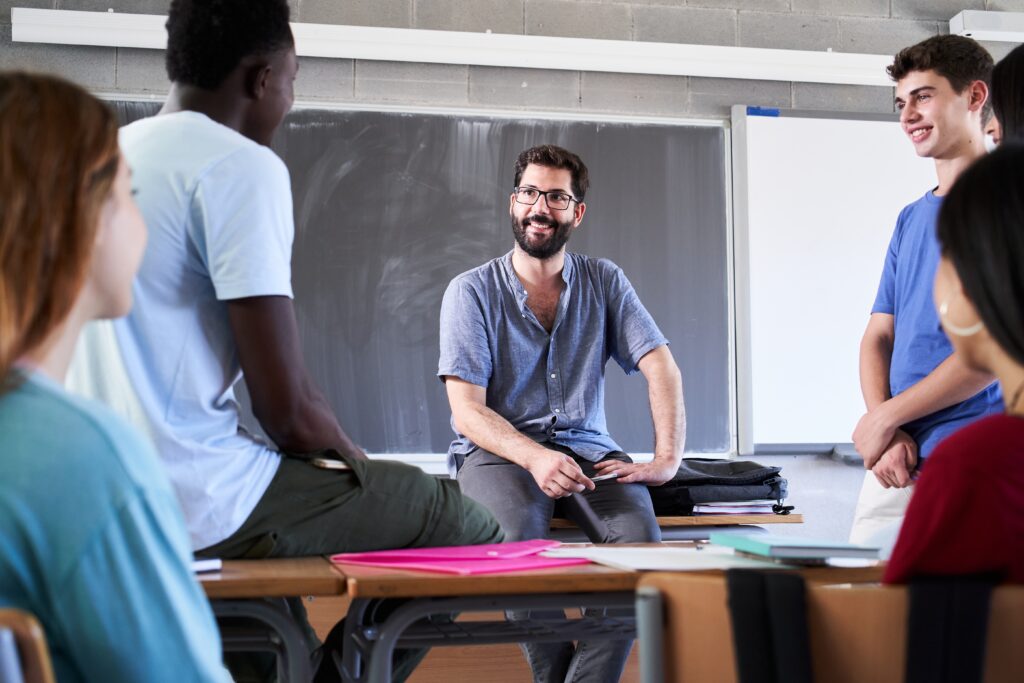How are youngsters and younger individuals (CYP) getting on within the UK? In current many years, social scientists have been pulling collectively information that counsel a regarding decline of their psychological well being and wellbeing, with youngsters reporting poor subjective wellbeing, low life satisfaction and highschool anxiousness in contrast with different nations of the World North (Kids’s Society, 2024). The press typically factors the finger at social media, COVID and different elements, however what about education? Research counsel that the college system is a major detrimental issue within the lives of lots of our CYP. While some get pleasure from faculty, many others, typically essentially the most deprived, expertise it as psychologically dangerous and that is reported, constantly, by younger individuals (Popoola et al., 2023) and households (Sq. Peg, 2022).
Regardless of this, CYP have virtually no say within the constructions and goals of schooling (Lundy, 2007) and their voices are silent in relation to implementing nationwide insurance policies. Historically, CYP are positioned as passive recipients of education who lack the house to exert company. This stands in direct violation of their primary human rights (United Nations, 2009) and democratic rules.
In response, the social enterprise States of Thoughts launched the Breaking the Silence (BtS) undertaking in 2019, in partnership with the Institute of Schooling, UCL. BtS sought to maneuver past conventional approaches to participating with younger individuals, specializing in co-creating new insights and options round schooling and psychological well being by Youth Participatory Motion Analysis (YPAR).

“YPAR can be utilized by researchers, practitioners and academics, and we hope Breaking the Silence offers an instance that may be drawn upon by others.”
What’s Youth Participatory Motion Analysis?
A YPAR strategy takes a view that these experiencing societal points are finest positioned to discover them, aiming to mix reflection (analysis and evaluation) with apply (motion) (Cornish et al., 2023), in what Freire (1970) refers to as ‘praxis’. Facilitators of tasks help CYP to plan their very own analysis questions, suggest options, select the best way to disseminate findings and take motion to precipitate change. It differs from conventional epistemological stances that worth notions of objectivity and neutrality, as a substitute putting onus on collaborative exploration, the era of data and crucially, motion.
The outcomes of Youth Participatory Motion Analysis (YPAR) tasks, similar to BtS, will be noticed at a number of ranges – specifically it could actually have a transformative affect on youth researchers; it could actually assist them to achieve a deep comprehension of chosen points and strengthen their sense of identification. A desired end result is the event of ‘crucial consciousness’ or an understanding of the systemic and structural roots of issues (Freire, 1970). Additional, members can construct a way of autonomy, possession and data round advanced points and construct an understanding of the best way to problem methods (Shamrova & Cummings, 2017).
What does this appear to be in motion? On this case, varied phases of BtS engaged teams of 12 months 12 college students (aged 16-18) from sixth-form schools throughout a London borough. College students utilized to hitch the undertaking and dedicated to collaborating in classes over an educational 12 months. To this point, BtS has progressed by 5 distinct phases, with every section aligning with the beginning of a brand new tutorial 12 months. Youth researchers volunteer to have interaction with the undertaking for one faculty 12 months, after which they hand the baton to a brand new cohort, who proceed to generate findings and participate in joint motion.
In section 1, youth researchers investigated how the schooling system impacts their psychological well being and wellbeing, in response to a authorities session on faculty accountability and Ofsted’s function. Following a number of focus teams with different college students, youth researchers wrote a letter to Amanda Spielman, His Majesty’s Chief Inspector at Ofsted, to share their considerations, talk insights and provide suggestions. They highlighted main flaws round how schooling is measured and the way this results in ‘memorisation’ as a substitute of studying, negatively impacting on the psychological well being and wellbeing of scholars and missing real-world worth. Youth researchers aspired for extra autonomy and for alternatives for CYP throughout education to: ‘uncover their strengths and weaknesses… whereas permitting them to start out distinguishing their distinctive values and preferences for the long run’.
The response acquired from Ofsted was perceived by the scholars as dismissive of their considerations and concepts. Members in section 2 explored pupil views across the affect of faculty on their private improvement and psychological well being. Their findings aligned carefully with different research (McPherson et al., 2023), noting excessive ranges of strain and psychological misery attributable to faculty practices.
The younger individuals recognized that the best way colleges are ‘judged’ has a profound affect on the form and high quality of schooling acquired and therefore, subsequent teams of researchers developed another framework for evaluating schooling. This work concerned conducting focus teams, interviews, and surveys with headteachers, academics, fellow college students, and former Ofsted inspectors. Throughout phases 3 and 4, the youth researchers created their very own analysis framework in response to their findings and named it the ‘Evaluation for Progress and Growth’ (RPD). They co-produced a documentary to share their experiences of participating within the YPAR course of and to disseminate the outcomes of their analysis.
By beginning with no pre-defined targets and permitting the analysis to evolve, members understand a robust sense of possession and might design highly effective and distinctive methods of presenting their work. The younger individuals have offered their findings to key stakeholders at quite a few conferences and to key politicians on the Schooling Choose Committee. They contributed to the NEU’s ‘Past Ofsted’ Inquiry, and have appeared in The Guardian. Though tough to measure, it’s attainable that Breaking the Silence has performed a task in shifting public attitudes and contributing to the rising motion for reforming Ofsted (NEU, 2024).
After every section a small variety of youth researchers—usually two or three—select to stay concerned with States of Thoughts. These younger individuals kind a working group who’ve continued to satisfy recurrently, pushed by their dedication to academic and social change. This sustained engagement highlights a long-lasting affect on their political consciousness and activism and therefore, a power of YPAR is that it could actually empower younger individuals to have interaction meaningfully in societal change at a number of systemic ranges.

“A YPAR strategy takes a view that these experiencing societal points are finest positioned to discover them, aiming to mix reflection (analysis and evaluation) with apply (motion) (Cornish et al., 2023), in what Freire (1970) refers to as ‘praxis’.”
Challenges and implications
Facilitating Youth Participatory Motion Analysis (YPAR) can current structural challenges. Specifically, a political and academic atmosphere that prioritises excessive stakes testing and a standardised curriculum (Kirshner, 2015). These points had been eased resulting from pre-existing relationships between States of Thoughts and the collaborating colleges and schools. There are additionally moral challenges, such because the potential for facilitators to inadvertently impose their views or misread the voices of youngsters and younger individuals (CYP) (James, 2007). We encountered difficulties in balancing the necessity to take management at sure factors with the danger of influencing the youth researchers’ views; it’s useful to have interaction in ongoing reflexivity and constantly verify understandings with the members to subvert this.
Importantly, to conduct YPAR requires adults to take another worldview, to give up management and permit the younger members time and house to deeply think about their experiences, generate a shared conception of the problems, plan and execute their very own analysis. In taking a place as co-researcher, it’s essential to proceed with no set of outcomes in thoughts and thus facilitate the cooperative era of recent data.
If we actually wish to discover the issues and conceive options to advertise the psychological well being and wellbeing of younger individuals, we have to transfer past the tokenistic posturing of ‘pupil voice’, the place a faculty council could also be used to determine what color to color the library, and embrace ‘coproduction’, the place adults share energy with CYP to make choices on points that affect their lives. We will then shift away from working on younger individuals to working alongside them. Our analysis explores how that is attainable. YPAR can be utilized by researchers, practitioners and academics, and we hope Breaking the Silence offers an instance that may be drawn upon by others.
NB this weblog has been peer-reviewed
References
- Kids’s Society. (2024). The Good Childhood Report.
- Cornish, F., Breton, N., Moreno-Tabarez, U. et al. Participatory motion analysis. Nat Rev Strategies Primers 3, 34 (2023). https://doi.org/10.1038/s43586-023-00214-1
- Freire, P. (2000). Pedagogy of the oppressed (thirtieth anniversary ed). Continuum.
- James, A. (2007). Giving voice to youngsters’s voices: Practices and issues, pitfalls and potentials. American Anthropologist, 109(2), 261–272.
- Kirshner, B. (2015). Youth activism in an period of schooling inequality. In Youth Activism in an Period of Schooling Inequality. New York College Press.
- Lundy, L. (2007). ‘Voice’ shouldn’t be sufficient: Conceptualising Article 12 of the United Nations Conference on the Rights of the Youngster. British Instructional Analysis Journal, 33(6), 927–942
- McPherson, C., Bayrakdar, S., Gewirtz, S., Laczik, A., Maguire, M., Newton, O., O’Brien, S., Weavers, A., Winch, C & Wolf, A. (2023) Colleges for All? Younger individuals’s experiences of alienation within the English secondary faculty system, Edge Basis.
- Millar, F (2022). Inspecting the inspectors: college students assess Ofsted regime’s toll on wellbeing | Ofsted | The Guardian
- Nationwide Schooling Union. (2024). Past Ofsted. House – Past Ofsted
- Nationwide Schooling Union. (2024). Substitute Ofsted. Substitute Ofsted | Nationwide Schooling Union (neu.org.uk)
- Popoola, M., Sivers, S., Hooper, R. & Ahad, A. (2023). Younger Peoples’ Views on Psychological Well being. “Faculty is an excessive amount of strain”.
- States of Thoughts (2019a) “We’re not studying, we’re memorising”: Learn London college students’ highly effective open letter. www.statesofmind.org/journal/2020/09/16/students-ofsted-open-letter.html
- States of Thoughts (2019b) Learn Ofsted’s reply to London college students’ open letter. www.statesofmind.org/journal/2020/09/28/ofsted-response.html
- States of Thoughts (2023) Breaking the Silence. https://www.statesofmind.org/breaking-the-silence
- Sq. Peg & Not Wonderful In Faculty submission of proof to attendance session February 2022. DfE Attendance Session (teamsquarepeg.org)
- UN Committee on the Rights of the Youngster (2009). Common Remark No. 12 The proper of youngsters to be heard.
Authors

Jaspar Khawaja is a London-based academic psychologist. Previous to his doctoral coaching, he labored in a secondary faculty with younger individuals who had skilled trauma, in addition to in a CAMHS inpatient unit for adolescents with psychological well being wants. In each his analysis and apply, he’s considering utilizing collaborative approaches with youngsters and younger individuals, prioritising the worth of experiential data to know and deal with issues attributable to unequal and dangerous social methods.

Dr. Chris Bagley is a psychologist, instructor, author and musician with an curiosity within the evolution of concepts, academic transformation and methods change. He’s Director of Analysis at social enterprise, States of Thoughts, Co-Director at Sq. Peg CIC and a tutor at The Institute of Schooling, College Faculty London. As a practitioner, Chris has spent a few years working with essentially the most marginalised younger individuals and households and specifically, these topic to highschool exclusion, jail and the youth justice system. He has revealed plenty of tutorial articles and e-book chapters alongside opinion items in The Unbiased, Byline Instances, The Psychologist and Schoolsweek. Web site: www.chrisbagley.co.uk


